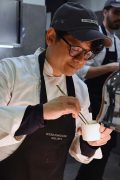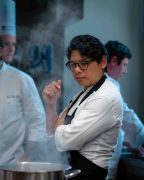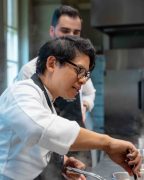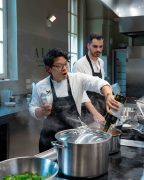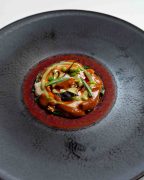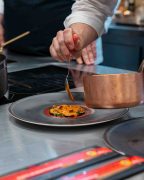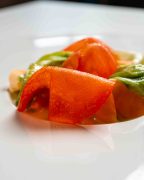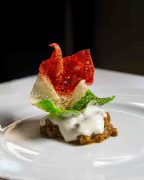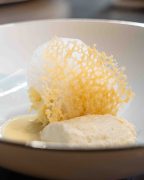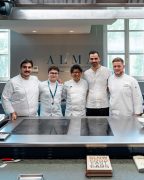
From ALMA to the kitchen most famous and acclaimed Chef in the world – Massimo Bottura – the step was quick for Allen Huynh. The student of the International School of Italian cuisine, Canadian of Vietnamese origin, is a sous chef on the prestigious restaurant “Osteria Francescana” in Modena with Chef Massimo Bottura. Allen has specialized in “Italian Culinary Arts” at the George Brown College in Toronto and arrived in Italy in 2014.
My culinary passion began at home, cooking alongside my mom. Vietnamese dishes and traditional recipes were a staple, but I craved exploration beyond the familiar. So I started cooking and experimenting on my own, even if I was cooking for my family as well, above all, myself. My foray into the restaurant industry started remarkably early, during my high school years. In fact, I’ve held various positions in this field ever since I was able to work, even while pursuing an art education. From the most basic kitchen tasks to more advanced roles, I’ve gained a comprehensive understanding of restaurant operations.
My path to ALMA began thanks to a suggestion from a chef at my school. He proposed a unique opportunity: a combined program at ALMA and George Brown College. Intrigued by the chance to delve into a culinary world beyond North America, I discussed it with my coordinator, Dario Tommaselli. He strongly encouraged me to seize this chance to experiment and broaden my horizons. I was in, ready to embrace this exciting new chapter!
If you really think in terms of Canadian identity or food, I don’t think there is much of a deep seated history, apart from aboriginal identity. Canadian cuisine reflects a melting pot of cultures, rather than a singular tradition. What is Canadian food is not necessarily identifiable in a solid object or a plate. It’s more a combined collective commutual memory of people about food, from all around the world.
Unlike Italy with its deep-rooted culinary history, Canada’s food identity is a vibrant mix of influences from immigrants around the globe: Indian, Chinese, Vietnamese, Pakistani, European, and more. This reflects the broader North American context of multiculturalism.
Italy, on the other hand, boasts a rich culinary heritage. Italian cuisine may not always appear ancient (like the recent invention of Tiramisu), but it embodies a long history and cultural identity. Regional variations, from the Greek influence in Pugliese cuisine to the Roman Empire’s legacy in Roman cuisine, showcase this enduring heritage.
It was during the 10th-anniversary celebration of ALMA and George Brown’s collaborative program that I met Massimo Bottura. He was invited to cook and celebrate the milestone, and to everyone’s surprise, he agreed. The event also included a student competition for an internship at Osteria Francescana. I participated in the competition, and the memory of that day is vivid. As I meticulously plated my dish in the hushed silence of the aula, I felt a pang of frustration. The atmosphere was sterile, lacking any interaction. Suddenly, Massimo broke the tension. “We need music,” he declared, and put on jazz from his phone, instantly transforming the ambiance. This moment, with the chef casual yet impactful gesture, is how I first encountered him.
ALMA wasn’t just an introduction to Italian cuisine; it was a crash course in Italian culture itself. Living and learning in a new country allowed me to see food through a completely different lens compared to my background. I learned how to manage myself in a high pressure environment. ALMA has great schooling and courses. The value it’s more the experience outside and your confrontation with the working reality.
For us, creativity always lies in the fact that we’re always looking ahead regardless of what we’re doing in the present. Each year, Massimo selects a conceptual theme that guides menu development from March until the following year. The current theme,”Globale,” takes diners on a world tour with an Italian lens, celebrating global diversity while showcasing Italian products and techniques. And for me, Inspiration comes from anthropology. I’m fascinated by how food reflects history and culture, exploring how seemingly iconic ingredients, like tomatoes in Italy or tiramisu, are not always so ancient. By researching the origins and evolution of food, you challenge assumptions and create menus that are informed by history and open to interpretation, much like art.
Can you share an interesting or funny anecdote from your time in the kitchen at Osteria Francescana?
One of my most cherished memories involves Takahiko Kondo’s wedding, which took place the year after I arrived. He and his wife, Karime Lopez, met while working as sous chef at a dinner in New York hosted by Virgilio Martinez and Massimo. Taka would use his days off to fly to Lima for fleeting visits with Karime, sometimes meeting halfway. One day, Taka’s eyes were sparkling and we all understood his intention to propose. Karime’s heart was set on a Mexican wedding, so sixteen of us from the Osteria Francescana team embarked on a journey to Mexico to celebrate with Karime and Taka
What advice would you give to young chefs?
Don’t take me as an example, my journey isn’t a one-size-fits-all recipe for success! If you want to be a good cook, don’t limit your inspiration to the kitchen. Explore art, science, literature, even mathematics! Diverse influences broaden your perspective and help you think creatively. This approach is essential for good cooking. Also, choose your culinary path based on passion, not prestige. Ask yourself truly what inspires you, rather than what anyone else is attracted to. Michelin stars and celebrity chefs are enticing, but true inspiration comes from following what ignites your own fire. Sacrifice things only when it’s worth it, your time and effort is not going to waste if you’re learning, if you wanna pursue it as something that it’s gonna be forever with you.

